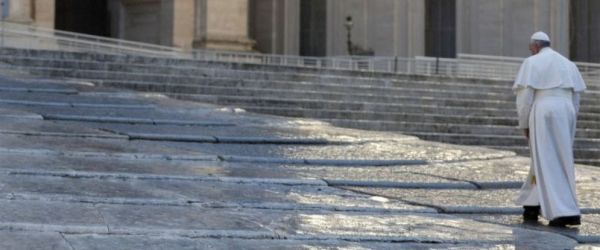The initial scene of the Gospel in today’s liturgy (see Jn 6,24-35) shows us some boats moving towards Capernaum: the crowd is going to look for Jesus. We might think that this is a very good thing, yet the Gospel teaches us that it is not enough to seek God; we must also ask why we are seeking him. Indeed, Jesus says: “You seek me, not because you saw signs, but because you ate your fill of the loaves” (v. 26). The people, in fact, had witnessed the miracle of the multiplication of the loaves, but they had not grasped the meaning of that gesture: they stopped at the external miracle, they stopped at the material bread: there only, without going beyond, to the meaning of this.
Here then is a first question we can ask ourselves: why do we seek the Lord? Why do I seek the Lord? What are the motivations for my faith, for our faith? We need to discern this, because among the many temptations we encounter in life, among the many temptations there is one that we might call idolatrous temptation. It is the one that drives us to seek God for our own use, to solve problems, to have thanks to Him what we cannot obtain on our own, for our interests. But in this way faith remains superficial and even, if I may say so, faith remains miraculous: we look for God to feed us and then forget about Him when we are satiated. At the centre of this immature faith is not God, but our own needs. I think of our interests, many things … It is right to present our needs to God's heart, but the Lord, who acts far beyond our expectations, wishes to live with us first of all in a relationship of love. And true love is disinterested, it is free: one does not love to receive a favour in return! This is self-interest; and very often in life we are motivated by self-interest.
A second question that the crowd asks Jesus can help us: “What must we do, to be doing the works of God?” (v. 28). It is as if the people, provoked by Jesus, were saying: “How can we purify our search for God? How do we go from a magical faith, which thinks only of our own needs, to a faith that pleases God?” And Jesus shows the way: He answers that the work of God is to welcome the One whom the Father has sent, that is, welcoming Himself, Jesus. It is not adding religious practices or observing special precepts; it is welcoming Jesus, it is welcoming Him into our lives, living a story of love with Jesus. It is He who will purify our faith. We are not able to do this on our own. But the Lord wants a loving relationship with us: before the things we receive and do, there is Him to love. There is a relationship with Him that goes beyond the logic of interest and calculation.
This applies to God, but it also applies to our human and social relationships: when we seek first and foremost the satisfaction of our needs, we risk using people and exploiting situations for our own ends. How many times have we heard it said of someone; “But he uses people and then forgets about them”? Using people for one’s own gain: this is bad. And a society that puts interests instead of people at its centre is a society that does not generate life. The Gospel’s invitation is this: rather than being concerned only with the material bread that feeds us, let us welcome Jesus as the bread of life and, starting out from our friendship with Him, learn to love each other. Freely and without calculation. Love given freely and without calculation, without using people, freely, with generosity, with magnanimity.
Let us now pray to the Holy Virgin, She who lived the most beautiful story of love with God, that she may give us the grace to open ourselves to the encounter with her Son.
[Pope Francis, Angelus 1 August 2021]












